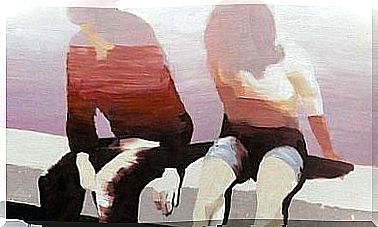Grudge Psychology: What’s Behind Hateful People?

Spiteful people permanently hold a burning piece of coal. They do it with the idea of being able to launch it at the least expected moment to all those who have offended them. However, those who end up burning are not exactly the others, but themselves, because they have been holding all that fire for so long, all that source of anger, hatred and discomfort.
Although some spiteful person we have known comes to mind right now, there is one aspect that we should not neglect. This dimension, this deep feeling (and without a doubt self-destructive) is not experienced exclusively by those who do not know how to practice the healthy exercise of forgiveness. In reality, this topic has its depth, its nuances and opposing dimensions in which all of us can derive at any given moment.
Thus, it can be said that beyond what it may seem we are facing a very recurring type of feeling. It is experienced, for example, by those who have been hurt, abandoned or betrayed by their family environment. It is suffered by those who have been cheated in their emotional relationship. The resentment is also that permanent sensation that inhabits those who have survived a war or an armed conflict. They are situations as we see understandable, although not healthy from a psychological point of view.
It is not, in the first place, because resentment is characterized by a highly harmful fact: chronicity. They are distressing states that last over time, that creep to the point of interfering with other areas of life. Mood changes, trust in others is lost, attitudes vary and even the type of treatment we provide to those around us is altered. The resentment is like rust, it spreads and ends up weakening all structure, all identity.

Rancorous people: characteristics and psychological profile
Spiteful people have a safe inside them. In it they hide the weight of a grievance, the pain of a deception, a betrayal or even an abandonment or offense. That box is armored for an obvious reason: they don’t want to forget a single nuance of what happened. Thus, to all that compressed and safeguarded moral damage, is added that sadness that at one point turned into rage and later into hatred.
Likewise, in all this psychological fabric a final component is usually added: that of the desire for revenge. Not in a direct sense or with violent components. Because what is desired in most cases is that in some way, the same coin, the same suffering and under the same conditions be returned to that person who hurt us. Therefore, and knowing this, it is common for spiteful people to present the following characteristics.
Inability to forgive
Sometimes forgiving is very difficult, we know that. However, we must be clear that forgiveness is above all that step that allows us to close a stage and regain emotional balance. Thus, and with regard to this type of profile characterized by deep resentment, it should be noted that in addition to not wanting to forgive, they feed their own suffering by remembering daily the weight of the offense or damage suffered.
There is therefore constant feedback and with it an intensification of suffering. In fact, studies such as the one carried out at the University of Pisa and published in the journal Frontiers in Human Neurosciencie , reveal that feeding resentment further opens the emotional wound. However, the act of forgiveness regulates a large number of neural structures, promotes calm, reduces stress and activates areas such as the prefrontal cortex (related to problem solving).

Dichotomous thinking
Either you are with me or you are against me. Things are either white or black, or you help me or you betray me. This type of approach forms a clear cognitive distortion. It is a very rigid scheme of thought of which spiteful people are not even aware because they are used to always skirting the extremes, to placing themselves in highly polarized positions where all they achieve is to establish enormous and bitter distances with those around them.
The pride that does not leave truce
Pride is a workhorse that invades, devastates and transforms everything. These characteristics mean that these types of people are always on the defensive, and that at the minimum they feel hurt and highly hurt. It is not easy to live, dialogue or reach agreements with someone who is always carried away by pride, by that attitude that takes everything personally.
Inability to meet emotional and psychological needs
They can hurt us all. In turn, and as expected, we have the full right to experience negative feelings towards those who hurt us. However, there is an aspect that no longer falls within the psychological normality: permanently maintaining that anger, that painful memory and the imprint that accompanies it, the same that ends up transforming into chronic bitterness.
We have a full obligation to accept what is accepted and move forward. Moving forward is not forgetting, far from it, but learning to use certain psychological strategies to deal with wounds and allow ourselves new opportunities. Thus, who does not do it, who is not capable of giving an escape, a valid way out of so much anger and bitterness ends up making resentment their way of life.

How to end the rancor that grips and dominates us?
In an article published in a behavioral psychology journal, there was talk of an interesting study carried out at the University of Ontario, Canada on this same topic. It argued the need to provide tools to resentful people to shape emotional forgiveness.
This dimension, this exercise in health, is decisive for a very simple reason: it allows us to free ourselves from negative emotions to generate a new psychological reality from which to start working.
- On the other hand, it is recommended that this type of profile works flexibility in your thinking approach. With this dimension we will make it easier for them to see things from new perspectives.
- Likewise, it is also convenient to offer tools for the management of anger, a dimension always inhabited by distorted thoughts and unhealthy physiological activation.
- In addition, spiteful people need to pay attention to other aspects with which they can move their gaze from the past to the present. Feeding exclusively on the negative memories of yesterday hinders the opportunity to live freely. Therefore, it is recommended that they start new projects, that they open up to new experiences, hobbies, relationships, etc.
To conclude, as they say, resentment is a bottomless abyss or a borderless wasteland. No one deserves to live forever in such a setting. Let us therefore learn to build escape routes, ways to free ourselves and breathe with greater tranquility and dignity.









